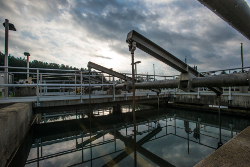Water is a Valuable, Limited Resource
Water is a Valuable Resource

Water is vital to sustaining wildlife, human health and vibrant social and economic activity. Sufficient water is needed in our rivers during critical periods of drought to sustain aquatic life. Energy production that relies on water can be reduced when enough water is not available. Farming depends on water and may need more in the future for irrigation due to forecasted climate variability. We all use water for bathing, cleaning, cooking and outdoor watering and Maryland's population is growing.
Water is a Limited Resource
Although water is technically a renewable resource, some parts of Maryland currently rely on ancient water in deep freshwater aquifers that is not readily renewable. It is also finite and risks running low if not managed carefully, even in a 'water rich' state like Maryland. The Final Report of the Advisory Committee on the Management and Protection of the State's Water Resources (2008) determined that, "State and local governments should strengthen their programs for water conservation, water reuse, and demand management."
Surface Water & Groundwater
Fresh surface water is found in streams, rivers, lakes and reservoirs. We find salty surface water in the ocean and bays.
Fresh groundwater is found below ground. Groundwater below clay layers through which water cannot flow, called 'confined, is deeper and can be very old. Unconfined groundwater typically shallower.
Humans are Responsible for Polluting the Bay
Interfering with a Natural Cycle
Water follows a natural cycle, falling as rain, soaking into the ground, being absorbed by plants and transpired as gas into the air, some ultimately reaching the sea via streams and rivers with evaporation feeding the clouds and ultimately condensing as rain to complete the cycle. The scale of human water use can significantly alter this cycle locally and regionally. If patterns of use are left unmanaged, surface and groundwater availability and quality can degrade putting society and our natural ecosystems at risk.
Humans Risk Over Overextending our Freshwater Resources
Humans are directly responsible for the increasing withdrawals of freshwater from surface and groundwater sources. Some areas of the State have robust water supplies for the long term, but may have aging infrastructure. Other areas have supplies that are limited, face competition for use and are at risk during droughts. Still other places rely on finite deep groundwater that is tantamount to mining a finite resource and not sustainable.
Interdependent Resources: Water, Energy, Food

Human activities that stress Maryland's water resources also stress energy and food resource sectors. The good news is that improvements made in one resource sector often have coincident benefits with other sectors. Water reuse has many co-benefits in addition to conserving limited water supplies. Water reuse can reduce pollution load from municipal wastewater plants to surface waters, can improve farm crop yields, mitigate drought impacts, and can reduce energy use.
Learn more: Oldie but Goodie EPA Brochure on Water Recycling.
Potable and Non-potable Reuse
Maryland's focus is on non-potable reuse of reclaimed water, meaning it is used for purposes other than ingestion (drinking, food preparation, bathing).
Using reclaimed water for non-potable needs, such as outdoor water, snow making, dust suppression and flushing of toilets, saves potable water and reduces the energy and cost of treating water to a potable level of water quality.
Learn about on-site non-potable reuse 6-min Video
Maryland has a Leadership Role in Water Reuse
Maryland Has Experience with Water Reuse
Beginning in the 1940s, millions of gallons treated water from Baltimore City's Back River wastewater treatment plant were diverted daily to the Bethlehem Steel plant to be reused for industrial purposes before being discharged into the Patapsco River. More recently, treated wastewater effluent has been reused for farmland irrigation, golf course irrigation, and for various needs of electric generating power plants. These uses have been driven largely by immediate need. However, additional opportunities remain for water reuse.
More Opportunities for Water Reuse
Maryland has opportunities to replicate the kinds of reuse activities undertaken in the past that would have long term benefits. In addition, Maryland has opportunities to benefit from new types of water reuse. In many cases, these new types of reuse have been pioneered in the arid Southwest United States or internationally, places that face water scarcity. These new opportunities involve non-potable uses in urban settings where public access is not restricted. The plumbing for reclaimed water is colored purple to distinguish it from potable water supplies.
Learn more about Innovations and Opportunities.
State Government's Role in Advancing Water Reuse

Maryland plays an important role in enabling reclaimed water reuse. While some private entities have economic incentives that motivate reuse, the State is also motivated by long term planning and other responsibilities. The State is responsible for ensuring the sustainability of water, energy and food production resources, all of which can benefit from appropriate reclaimed water reuse.
The State can promote reuse by establishing water quality standards for safe reuse, creating legal certainty via clear laws and regulations, providing technical guidelines, removing real and perceived barriers and facilitating the partnerships needed for reuse projects to be successful. Reclaimed water reuse is an important tool with economic and resource management benefits. By enabling this tool, the State hopes to address today's needs and lay a good foundation for future generations.
Learn more about State Water Reuse Laws, Regulations and Guidelines.
Up next: What are Ways to Reuse Water?
There are many sources of water that can be reused including rainwater, stormwater, graywater, municipal wastewater and industrial water. There are also many ways of reusing these various sources of water.
Learn more about Ways to Reuse Water. (Next Page)
Contact Information
Please direct questions or comments to Jim George.
